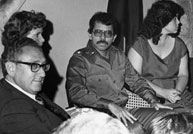A second act with class
Watching Pauline Frixione, McGill's convocation czar, preside over the myriad tassle adjustments, mortarboard dustings and program corrections involved in keeping the university's convocation ceremonies humming would make for a brilliant challenge on the Identity show. How many contestants could fathom that this poised and diplomatic professional matches the previous life label of "Central American revolutionary"? But long before Pauline Frixione was convocation liaison and administrative officer, working out of the Secretariat at James Administration Building, in the early '80s she was a Sandinista translator working side by side with Daniel Ortega as he led her native Nicaragua in a populist revolt. "I look at pictures from then and it's someone else I see. That's not me," she said of a photograph of herself with Ortega and former U.S. Secretary of State Henry Kissinger.

Before she was convocation liaison at McGill, Pauline Frixione, far right, was personal translator for Nicaraguan leader Daniel Ortega, near right. In this 1983 photo, Henry Kissinger is on the far left with his own translator.
Courtesy of Pauline Frixione
Frixione's journey from the upheaval of revolutionary life to McGill was presaged many years before her birth, when her father was denied entry to the United States because he'd been president of Nicaragua's University Students Union and, as such, was branded a communist. The young urologist chose instead to come to Canada, and while he was conducting post-graduate medical work here, he met a local girl, Helen Murphy, head nurse of St. Mary's Hospital operating rooms. She followed him to Nicaragua and they started a family.
In 1972, young Pauline was visiting her maternal grandparents in Westmount when an earthquake devastated the Nicaraguan capital of Managua and, among other disruptions to life, cancelled school. She finished high school at Villa Maria and stayed through the start of CEGEP. "When I was 18 going on 19, the revolution triumphed in Nicaragua and I was filled with excitement and decided to go back. For a 19-year-old, to be part of a revolution?" she let the question hang incongruously in a quiet Secretariat conference room in the James Administration Building.
Back home, Frixione threw herself into every possible effort to reclaim her country from decades-long oppression. "I worked hard. I picked coffee. I picked cotton. Because I hadn't fought in the revolution, I had to prove that I was a true Sandinista." The great-great-granddaughter of José Santos Zelaya, a turn-of-the-century Nicaraguan president who was ousted by the U.S. government, she said, "My family has deep convictions and a long struggle against tyranny and oppression."
Her fluency in English got her a translator's job, first in the Ministry of Health, then in the Ministry of Foreign Affairs working in the protocol office at Managua's international airport, where she greeted VIPs, and eventually at Ortega's side, as his personal translator. While working for him, she met everyone from PLO leader Yassir Arafat to Swedish Prime Minister Olof Palme to Cuba's Fidel Castro, who, she remembered, "had the bluest eyes I've ever seen."
At 22, she gave birth to her daughter, Helen Arceyut-Frixione. For Frixione, the dream of the revolution died when, as a young mother, she waited and waited and waited some more in rationing lines for milk for her baby. "I started working for the British Embassy, as assistant to the chargé d'affaires, and then I worked for the enemy of humanity, as America is called in the Sandinista anthem." She was culture affairs assistant and translator for, among others, U.S. President Jimmy Carter.
In 1988, 10 years after landing in Managua to help her people, Frixione returned to Montreal and enrolled at McGill as a mature student. "I wanted to give my daughter a good example in life. I'd had just one year at CEGEP. I was a single mom and I graduated with great distinction." Her daughter Helen is now studying for a BA in psychology.
Frixione began working on convocation when it was returned to lower campus in the spring of 2004. "I work with a great group of colleagues and volunteers from across the university," she said. Every year after convocation, she returns to Nicaragua, where her mom continues to work as the staff nurse at the U.S. embassy. Her father died at 77 in 2005. "He worked until the day he died. My parents lost all their savings after the currency was devalued."
In November 2006, Ortega was elected president. "Now he has to prove himself. It's easy to complain when you're an outsider and now he has the power. We'll see how he does. "
For Frixione, her work at the Secretariat is "a continuation of believing in what I do. I will see students point and say to their parents, 'That's where I had my class.' My own convocation was a really, really big day in my life. I remember crossing the stage and I cried. My daughter was in the audience. She was nine."
Helen is to graduate in 2008. "It will be a big moment for me and hopefully I'll still be doing convocation. Who knows what life has in store for me."

